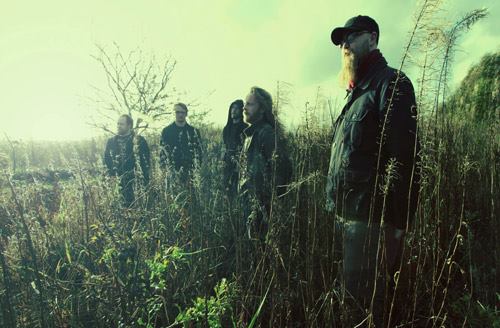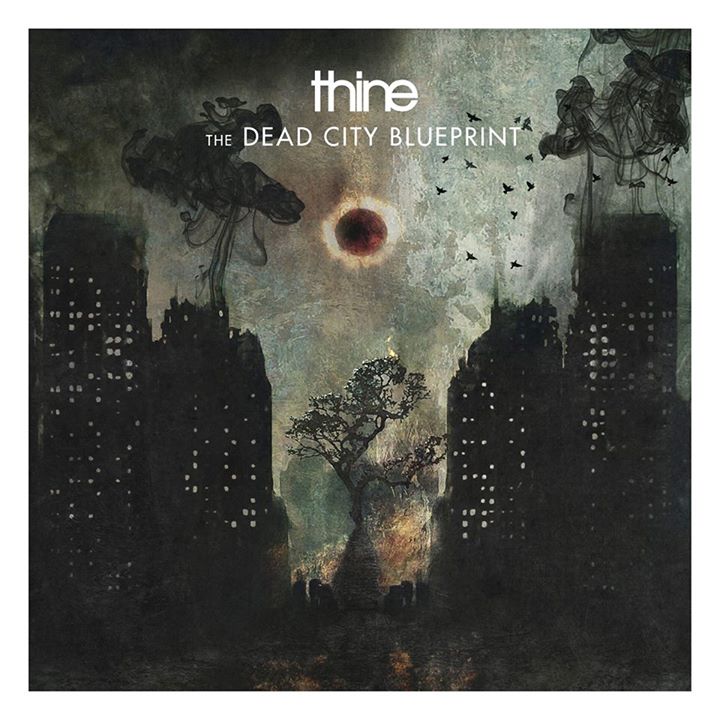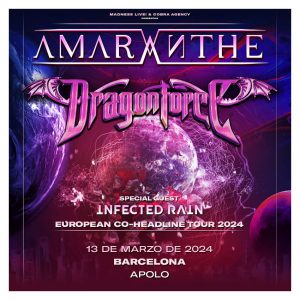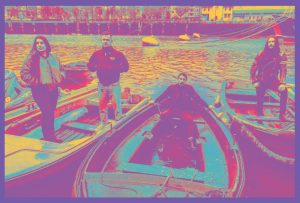THINE (Eng.)
– Hello and first of all, thanks for taking the time. What are you currently up to? How are you feeling about being back on track with THINE?
Feeling a little anxious, haha. Been such a long time since the previous one. Reception has been great so far generally (though obviously can’t please everyone), and we’re satisfied ourselves… but it’s a strange process. As a proud parent sometimes you don’t truly know if you have an ugly child or not. You love it regardless, but sometimes you just don’t know how others view it, though you hope it finds its way in the world and gains acceptance even though its every move will be judged. Times are different for the industry. Sales are hard to predict. The band has to be done for the love of music over money, that’s for sure.
– Your previous album, «In Therapy», was released none less than 12 years ago, throughout which you have been almost silent. What have you been up to during these last years?
You are correct in that we were silent, somewhat, though the band never actually stopped. But life gets in the way sometimes, and people have to travel their own paths for a while on this curious voyage of life. We continued to play live for a few years after In Therapy. Our drummer left for several years before returning around 2008 or something. Still kept writing songs all along though. Previously it used to trouble me, that time was slipping away and nothing was happening, then I just thought “when the time is right, then it will happen”, so I guess the time was right, the circumstances were right, and here we are once again. But really, it has not felt like 12 years at all. Time (as it is perceived) just accelerates the older you get it seems, and not much you can do to stop it.
– And how do you think has the band evolved over these last 12 years?
There’s much more maturity now, as I think is evident on the new album. In Therapy was more a straight dark rock/metal album, but I feel we are much more than this. There is a better diversity to this album, some deeper emotion than previously, better songs, genuine songs. We also brought back some of those more prog type ideas from our first album, and slightly more epic arrangements, it could be said. We didn’t want to merely re-write In Therapy type songs. That would be pointless, and only serve to resurrect what was, & not to nurture what IS.
– I consider all your releases essential but I think, for some reason, you have always been a quite underrated band. Do you think is there any reason behind this? Now things aren’t like a decade ago, Internet nowadays is much more present and there’s an easier access to music so, do you think this situation might now change for you?
I agree a lot. I think we stand up very well to bands we get compared to, but for whatever reason it has been hard for us to reach those same crowds, and I think this will probably continue. We’ve never had that hype to push us along, but at least we have some very dedicated fans who appreciate what we do and have stood by us through the years – and we have even affected some people’s lives for the good when they have had troubled times themselves. This isn’t necessarily about sales, but about projecting your art to the masses and perhaps even making a small difference along the way. But really it brings up a question of fulfillment. What does it take to reach a point of satisfaction in life? Must we be rich, must we be worshipped, must we be influential, must we be leaders? Is it not enough just to simply exist? Seems a very human ego-driven condition in that it’s never enough, so as a consequence we’re never happy. So yes, good question, and if you find the answer please let me know, haha.
– I have read you have spent some time refining the songs that are part of your new «The Dead City Blueprint» so, how and when did this new opus started to get shaped?
The oldest song on there (Brave Young Assassin) is originally from around 2003, so that has had plenty of refining and rewriting to get it into the shape it is in now. Many many songs were written since In Therapy, but gradually as new songs were written, they replaced the older ones. They all formed a small yet significant part of the evolution of this album in its formative years, but eventually a dark period for myself in 2012 led me to write all of the new album songs in a 7 month period (except Brave Young Assassin) and get rid of the rest. Still constant refining on these songs though, so the emotional impact was as strong and poignant as possible. I hope we succeeded there.
– Your debut album was «A Town like This», 4 years later your sophomore «In Therapy» came out, which was built upon the foundations of your previous record but with a certain sound shift, or musical progression if you like. Now on «The Dead City Blueprint» I think you are making the elements off your second release more solid and stronger. Is your new opus the best depiction of what THINE is all about or are you just through a constant evolution?
I think we constantly evolve. Each album is a snapshot in time, of where we stand in our lives, as people. I don’t think Thine can be defined by a particular style though, as it not a conscious or considered part of what we represent. People might say we are a rock band because we wrote a rock album with In Therapy, but we (or certainly I) don’t feel that way. We are not restricted, because we do not stand still. Our thoughts change, we grow and evolve. And since we don’t release albums every couple of years, our jump in evolution and diversity appears more substantial. The Dead City Blueprint i’d say represents Thine more perfectly than ever, but only in THAT moment, because that time has already passed – slipped away into history as soon as it was born.
– One of your strong points and trademarks have always been those dark and bleak atmospheres, something that creates a certain enchanting feeling. Where do you draw inspiration from to create that overall atmosphere and is there anything you want to convey with it?

Hmm, not too sure where it comes from. Some dark recesses somewhere and very real feelings, but it’s something that when writing I personally work extremely hard on. I form a (usually bleak, haha) vision in my mind and so then try to work towards bringing that to ‘life’ as accurately as possible. But yes, on occasions songs can be inspired by a few notes of a song I hear randomly (a 4 second part of a Kate Bush song led to one of the tracks on this album, I remember). These atmospheres are from deep within, and it helps me personally to to be able to bring these out and turn negatives into positives.
– Besides this melancholic feeling I also find outstanding the way you mix different musical influences, Rock, Prog and Metal but without being possible to tag you nor point out a certain Metal subgenre you sound similar too. You’ve been that unique since the very beginning so, did you have clear since the moment you formed the band you wanted to create such a personal sound?
Thanks a lot. I think that’s because it isn’t really a conscious decision on what style to be, just what flows naturally to represent the mood or sentiment. So I like to think that it just fits together as a whole without being awkward or forced. We get compared to various prog bands, but don’t really listen to prog. Don’t really listen to rock much either, so we evolve into a product of ourselves than of our influences. Or sometimes in the past i’ve wanted to create something that has a feeling of The Doors for example, but it is only my pereption of what The Doors are and not the reality. It’s like withdrawing into your own world. One of interpretation and warped perception. In the early demo days yes I think we had our individual identity even then, as we were developing, but I don’t remember us thinking we absolutely must sound completely different to everyone else…though yes, we didn’t want to sound like the doom bands or the black metal bands, or the thrash, or the folk, or the rock bands. When we got a record deal we were told that the main thing was to be original, and so our first album ‘A Town Like This’ was very much its own beast, different from most other metal music and taking in many styles to create this (at times) eerie and uneasy atmsphere. Ultimately it was a little too fragmented, but that was the nature of the compositions back then. Each song was like a short film, with switching ‘scenes’ and a dark, abstract script, heh. Now the songs flow as one whole cohesive journey.
– Anyway you have been compared to bands such as KATATONIA or ANATHEMA, and there certainly are some similarities but, what bands could you mention as the most influential ones for the THINE’s sound?
That’s a good question, because I really don’t know. There must be small influences here and there and everywhere, but it is song-writing born out of feeling. I can see a bit of Anathema and Katatonia from years ago, but I think that had stopped by the time of In Therapy. Beyond that it is just walking our own path. I remember ‘Cold Seed’ by Tiamat having a small influence in shaping some of the approach of In Therapy songs too, but for this album – nothing. Just personal turmoil and striving for a sense of vindication and renewal as a result. It just comes from…somewhere. Moments of inspiration given form.
– Your music is really emotional, as I’ve said earlier, also in lyrical terms. In fact lyrics fit perfectly the mood on your music. Is something you strive for the make everything on your albums be part of a whole thing?
Yes, it all comes hand-in-hand. Spent a very large amount of time analysing each line and word and even the rhythm of sylables, on this album. Constant rewriting to get the visual image painted by the lyrics to reflect the music and perfecting the emotions that the music represents. Extremely important. I think it worked well on this album, much moreso than before. Nothing fake or forced at all. Not written to sound cool or brutal. Just real and honest. I think there has to be something going on deep under the surface for this to come out as it does, but it takes time and patience.
– And, being such emotional music, where do you take inspiration from for lyrics? Could you see an album like a description of a certain moment in your life?
This album absolutely has come from life and tribulations, numbness, and the aforementioned period in 2012. There are many existential themes in there too, some social commentary based around detachment, themes of mortality, lots of introspection, some reflection, some concepts around destruction and renewal, plenty of psychology in there. In a sense it is a diary of a period of time now in the past, and though the content can seem quite negative, the purpose is that it is a catalyst to become symbolic of optimism and change. That every dark tunnel will have an end, and at the end is illumination and discovery, in whatever manifestation that may present itself. For whether it be through light or darkness, life is all about embracing the journey – the moments between beginning and end.
– Everything sounds emotional and flows naturally, but the groove, the catchy melodies… Everything looks like is emotional still calculated. Due to this I would like to know how do you use to work on the songwriting process.
 I get a feeling then I build on it and explore it. Something representing loss or vulnerability or beauty, etc etc. I record a rough demo of it at home and can then soak up and evolve this feeling. Often it is music which comes first, but sometimes a line, or a few words which form some statement, and a tune will come from those words because of how the words sound together, and then it flows from there (sometimes the words can be initially non-sensical too, until the pieces of the puzzle are slowly filled in). Then will write and rewrite lyrics until the message is clear (and often with multiple meanings). Enjoying playing keyboards too these days for added bits of atmosphere.
I get a feeling then I build on it and explore it. Something representing loss or vulnerability or beauty, etc etc. I record a rough demo of it at home and can then soak up and evolve this feeling. Often it is music which comes first, but sometimes a line, or a few words which form some statement, and a tune will come from those words because of how the words sound together, and then it flows from there (sometimes the words can be initially non-sensical too, until the pieces of the puzzle are slowly filled in). Then will write and rewrite lyrics until the message is clear (and often with multiple meanings). Enjoying playing keyboards too these days for added bits of atmosphere.
– On the other hand, Dan Mullins is back in the band. What prompted he rejoined you? Moreover he has engineered the album. What are the pros and cons of having a band member taking such duties?
Can’t fully remember why he rejoined. It might have come from one time when the rest of us ended up rehearsing at his house and then talked about making a demo, several years back. Then after a while I took some songs to his place and we played through them, just he and I – maybe 6 or so songs. Then it built from there. Our former drummer is now our bassist, so there were no problems there. We didn’t have to get rid of anybody. Dan did a good job on the engineering, and due to our relationship with the owner of Academy Studios we got as much time as we needed in order to record. The pros of Dan doing this was that it afforded us more overall control over the production and direction compared to any previous release, and he obviously had some knowledge of the songs prior to us entering the studio, so he/we knew bascially how they should go. Not sure there were too many cons, though he himself could probably not enjoy seeing the songs take shape as much, being so involved with the tiny details, but that was the same for me to an extent as well I guess. Over time you can stand back and appreciate what became of the hard work anyway.
– All this about «The Dead City Blueprint» being said; how could you describe it in just 3 words?
A painful reminder
– And finally, what are your near-future musical plans?
Continue writing and refining new songs, then who knows. If people want another album i’m sure we’ll do one before 2025, haha – otherwise will keep on writing regardless.
– That’s all, thank you once more for answering our questions. If you want to add some final words; feel free to do it.
Thanks a lot for taking the time and interest to see what we are about, and hopefully it gives a good insight for your readership. Cheerio.







